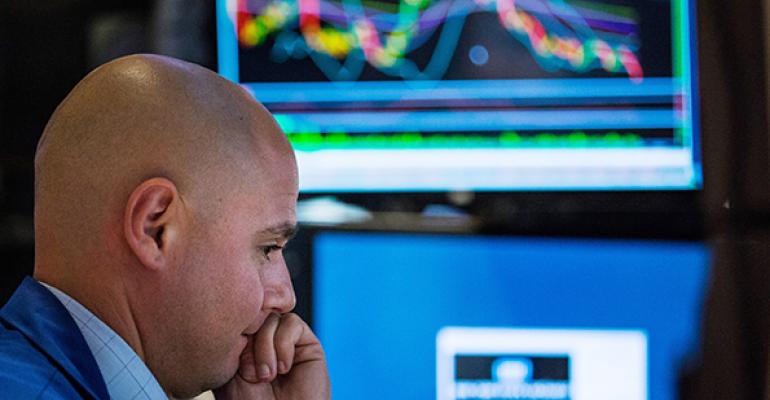(Bloomberg Opinion) -- On April 8 and 9, Jews around the world will gather – perhaps via Zoom for many - for Passover Seders. Part of the ritual is the Ma Nishtana, or the four questions, all of which begin, “Why is this night different from other nights?” Investors of all religious faiths, or none, would do well to ask themselves, “Why is this stock market crash different from other stock market crashes?”
Markets expect dividends over the next 21 months will be half what was expected at the end of 2019.
In modern history, bigger crashes have been associated with far smaller real dividend declines. The 2000s saw a 6.3% real dividend decrease over 36 months (that is, total dividends paid were 6.3% less than expected, after inflation, over the period). In the 1970s, there was a 5.8% drop over 45 months. Even in the Great Depression, real dividends were only depressed 26.7% over 47 months.
There are two obvious reasons for the expected unprecedented dividend decline. The first is that coronavirus pandemic is already causing a much steeper decline in short-term cash flows for companies than it is hurting their long-term prospects. Second, government regulations and bailout conditions are likely to include tight restrictions on dividends.
Why this matters:
The two big uncertainties for stocks are how long and how deep the shutdown-induced depression in real activity will be, and what the economy will be like afterwards. Dividend expectations relate only to the former, but long-term investors should focus on the latter. The dividend uncertainty could resolve quickly, and futures predict very rapid growth afterwards. Equities usually go down quickly and up slowly, but dividend futures suggest this stock recovery could happen as rapidly as the crash.
This is an exogenous recession.
Painful as they are, most recessions deflate bubbles and clear out deadwood. The hardest hit companies and sectors are those that were overvalued and those that are in long-term decline. Recessions are typically endogenous, caused by the internal workings of the economy. But this crash is hitting sectors mainly based on the ability to generate profits under lockdown conditions, which is unrelated to past valuations or long-term prospects. As Warren Buffett has said, “Only when the tide goes out do you discover who's been swimming naked.” But Covid-19 is more like a tsunami than a tide, so watch carefully for brief glimpses to find the naked swimmers.
Why this matters:
The main similar events in the past are major wars. The recovery from the coronavirus crash, both in the economy and the financial markets, may look more like the post-World War II period than more recent recoveries. Another possible parallel is the aftermath of the 1973 – 1975 oil shock. Word to the wise: both of these periods stunned most economists and led to thorough re-evaluations of economic theory. Also, unlike previous recoveries, we can’t count on bubbles having been deflated and deadwood cleared out. The crash was not caused by bubbles or senescent companies, so it did not hit them disproportionately, so they may survive the stress.
The scale of government intervention is unprecedented.
As a financial market crash, this one barely makes the Top 10 since 1900, but the government reaction has already exceeded that of the 2008 crash and the spending seems nowhere done. Only the response to the Great Depression seems bigger as a percentage of GDP, and that only began in earnest more than four years after the stock market crash.
Why this matters:
Investors may want to pay less attention to what their portfolios are worth today and more to what money will be worth when this is all over. Will stimulus spending find its way into consumer prices? Asset prices? Or be sopped up with taxes? Or something else? Will powers now seized in the interests of public health be kept for other government purposes after the virus is under control? Will restrictions on payouts to investors—limits on dividends and buybacks—combined with wealth taxes and other ideas that may get a boost from the crisis do more damage to portfolios than the crash itself?
A lot of people will die.
Perhaps more than in major wars. One of the reasons I went into finance is if you screw up, nobody dies. Any money you lose today, you can make back tomorrow. While it’s true people’s lives can be ruined by financial crashes, and death rates go up in the ensuing recessions, the alternative to boom-and-bust seems to be stagnation, not steadily increasing prosperity. Dynamic, free economies are more disruptive than planned ones, but lead to longer life expectancies and richer lives.
Why this matters:
Because lives matter. But even from a strictly financial point of view, a death-dealing crash can be expected to have longer and deeper social and economic changes than one that’s only money. The terrorist attack in September 2001 wasn’t a major financial event compared with the stock market crash that began 18 months earlier, but it had considerably more economic effect. World War I, World War II and the Vietnam War led to profound cultural changes that defined generations.
Of course, wars and pandemics are not the same thing, even if they kill similar numbers of people. Nevertheless, any event that takes lives is in a different category than one that only makes some investors cry.
To contact the author of this story:
Aaron Brown at [email protected]
To contact the editor responsible for this story:
Robert Burgess at [email protected]





